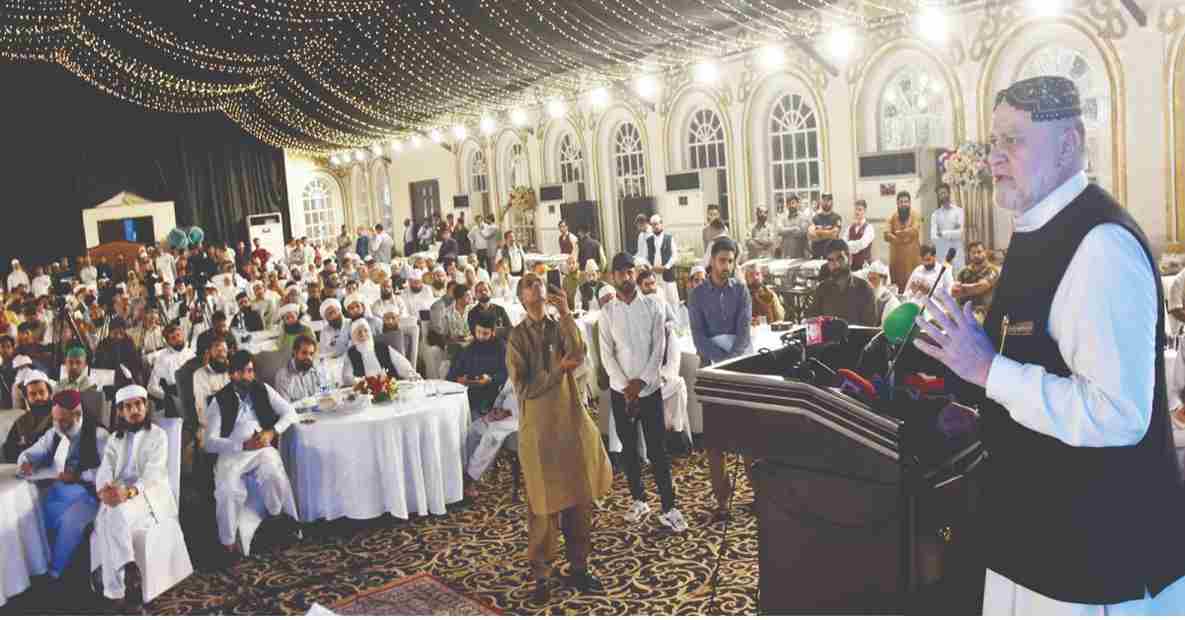Syed Imran Ahmed Shah Champions Sufi Legacy in Conference

Federal Minister for Poverty Alleviation and Social Safety, Pir Syed Imran Ahmed Shah, has said that the Sufi saints taught humanity the values of love, tolerance, and patience.
He stated that the world today is in dire need of spiritual peace and social harmony, and promoting Sufi teachings is a pressing necessity of the time.
Syed Imran Ahmad Shah was addressing the International Khidmat (Service) Conference organized by Muslim Hands International in celebration of 100 years of Islamic services by Dar-ul-Uloom Muhammadia Ghousia Bhera Sharif.
The conference was attended by Chairman of Muslim Hands International Pir Syed Lakht-e-Hasnain, Secretary of Religious Affairs Syed Tahir Raza Bukhari, Chairman of the Islamic Ideology Council Raghib Hussain Naeemi and Galib Al-Husseini from Turkey.
Pir Muhammad Amin-ul-Hasanat Shah of Bhera Sharif, Jameel-ur-Rehman Chishti, Mufti Ramzan Sialvi, Mehr Kashif Younis, along with national and international Sufi scholars, religious leaders, and spiritual personalities also participated.
Speaking about the traditional Sufi lodges (Khanqahs), the federal minister said they have not only served as centers for spiritual reflection and remembrance but have also played a pivotal role in public welfare and social services. These were places where both the rich and the poor, scholars and laypeople, were given equal respect.
He highlighted that Sufis made remarkable contributions in the fields of education, healthcare, peacebuilding, support for the poor, and moral leadership. They also played an ideological and practical role in the Pakistan Movement.
Syed Imran further said that the true identity of Pakistan is rooted in the message of peace and love preached by the Sufis, which must be promoted globally.
He emphasized that connecting the new generation with the teachings of Sufis is critically important so that values such as service, patience, and brotherhood can flourish in society.
The minister urged everyone to make a pledge to follow the path of the Sufis—a path that unites hearts, ends hatred, and uplifts humanity.
He said that this international conference is a historic moment held to pay tribute to the various social services of the Sufi saints.
Sufism, he said, is not merely about spiritual rituals but represents a complete way of life based on service, love, humility, and justice.
Syed Imran Ahmad added that the Sufis laid the foundations for public reform and welfare through their character.
They made no distinction among people, spreading communal meals at every doorstep and lighting the lamp of love in every heart.
During the conference, the Urdu translation of the renowned Turkish Sufi scholar Sheikh Al-Sayyid Abdul Baqi Al-Husseini’s book “The Enlightened Path of Sufism in the Light of the Quran and Sunnah” was introduced. The translation was done by Dr. Naeemuddin Al-Azhari.
The book presents well-argued discussions on topics such as the definition of Sufism, its Shariah basis, spiritual allegiance (bay‘ah), remembrance (dhikr), the etiquette of a perfect spiritual guide, and the role of the Sufi lodge, all in light of the Quran and Sunnah.
The conference was also addressed by Chairman of Muslim Hands International Pir Syed Lakht-e-Hasnain, Secretary of Religious Affairs Syed Tahir Raza Bukhari, Chairman of the Islamic Ideology Council Raghib Hussain Naeemi, Pir Muhammad Amin-ul-Hasanat Shah of Bhera Sharif, Galib Al-Husseini from Turkey, Professor Dr. Buland, and others.
At the conclusion of the conference, a renewed commitment was made to connect Pakistan’s identity with the Sufi message of peace and love and to familiarize the younger generation with this message.
